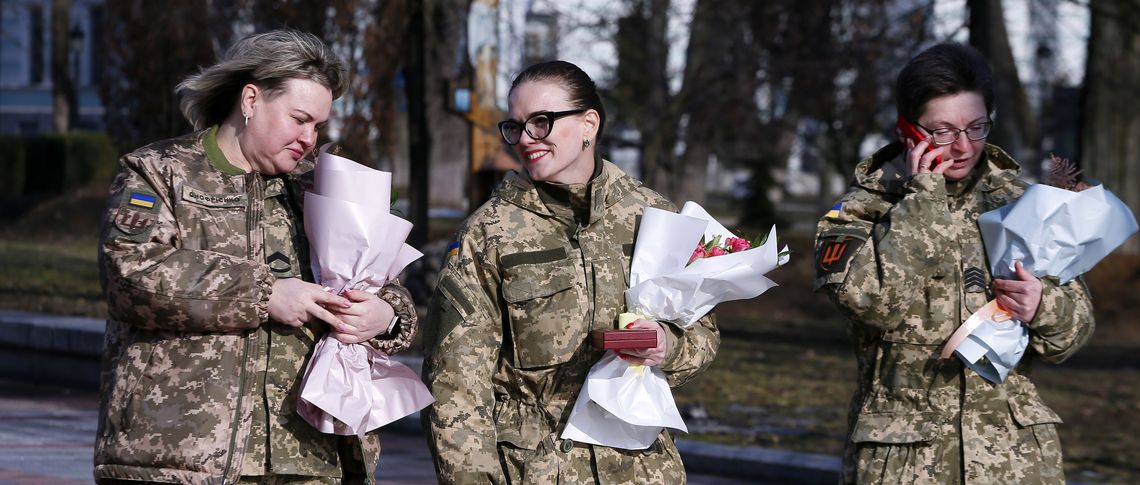The podcast ‘1325: Women, Peace, Security – From the UN to Ukraine’ became not only my job, but also a space of trust. A place where you can ask the most difficult questions and hear honest answers. Because when women talk about war, they don’t just talk about destruction. They talk about their experiences of living through war, about recovery and human resilience.
Women do not only suffer from war — they shape decisions, document the truth and take responsibility. Ukraine’s experience confirms that involving women in peace and security processes strengthens the stability of the state. This is precisely what Resolution 1325 is about, which 25 years ago first defined that issues of peace and security cannot be resolved without the participation of women.
When the UN Security Council adopted Resolution 1325 in 2000, the world was talking about the Balkans, Rwanda and Afghanistan.
Today, with a full-scale war raging in the heart of Europe, Ukraine reminds us every day that Resolution 1325 is not about the past, but about the present.
The wars in the former Yugoslavia (1991-1999), especially the events in Kosovo, became an example of systematic sexual violence during war, which influenced the wording of 1325. The genocide in Rwanda in 1994 showed how women can be both victims and a driving force for peacebuilding, something that was often mentioned in speeches when the Resolution was being discussed. The situation in Afghanistan, where the country was under Taliban rule from 1996 to 2001 and women’s rights were virtually destroyed, shaped the understanding that without the participation of women, it is impossible to talk about a just and sustainable peace.
In the Security Council debates that preceded the adoption of the Resolution, it was precisely these conflicts that were cited as examples where women were disproportionately vulnerable but excluded from decision-making processes.
Today, with a full-scale war raging in the heart of Europe, Ukraine reminds us every day that Resolution 1325 is not about the past, but about the present. In Ukraine, during the war, women serve in the army, work in the media, support communities, conduct negotiations and document war crimes.
Why telling stories matters
In 2014, women took on roles that the state did not recognise at the time. They were soldiers, paramedics and volunteers, but officially they were ‘cooks’ or ‘secretaries’. It was pressure from civil society and the implementation of Resolution 1325 that gradually changed policy: the state opened up combat positions to women and, in 2016, adopted its first National Action Plan. Today, around 70000 women serve in the security and defence sector, and this number is constantly growing.
The implementation of Resolution 1325 is not just about government plans and strategies. It is about daily work on the ground and, in particular, the contribution of women to journalism.
It is they who document war crimes: sexual violence, deportations, torture. A female journalist explained that when investigating cases of conflict-related sexual violence (CRSV), the most important thing is to prevent the re-traumatisation of victims. According to her, the team works with survivors very carefully: it offers psychological support and allows them to review the material before publication to ensure that they are ready to have their stories made public. She emphasises that these women are not just heroes of media stories, but those who have endured and survived.
Journalistic investigations into abductions, deportations or sexual violence, are already being forwarded to the Office of the Prosecutor General.
For example, The Kyiv Independent, in collaboration with OCCRP, produced the documentary film He Came Back, which tells the stories of Ukrainian women who were raped by Russian soldiers. The team of journalists collected testimonies from the victims, identified the perpetrators and handed over the evidence to Ukrainian and international investigators. In this way, journalism becomes part of the justice process, with women acting as documenters and witnesses. This work demonstrates how the principles of Resolution 1325 are put into practice — through female journalists who become part of the security system.
In another recent investigation by The Kyiv Independent, ‘Russia is training Ukrainian children from occupied territories to fight in its war,’ the systematic militarisation of Ukrainian children taken to Russia from occupied territories is exposed. Under the guidance of Russian officers and former Wagner fighters, children are taught to fight – to use weapons, operate drones and dig trenches. The work of journalists shows not only the crimes of the occupiers, but also the depth of the trauma that Russia is trying to inflict on the next generation of Ukrainians.
It is noteworthy that when we talk about the implementation of Resolution 1325 in Ukraine, we most often think of military service, humanitarian aid and political representation. Another important aspect is information security, which is shaped by journalists covering crimes, human stories and the rights of victims.
Their work is directly linked to the fourth pillar of the Resolution, namely recovery and reintegration. Because reporting on crimes is a step towards justice and, therefore, towards restoring peace.
Journalistic investigations, for example, into abductions, deportations or sexual violence, are already being forwarded to the Office of the Prosecutor General. This means that the media are becoming part of the accountability system, even if they do not have a court mandate.
It is important to understand that the implementation of Resolution 1325 is not just a top-down policy.
During the full-scale war, the Ukrainian media found itself between two challenges: national security and freedom of speech. Every day, journalists face a difficult choice: how to tell the truth without causing harm. Independent journalism remains important even during wartime, because it is what helps to preserve democracy.
After all, the Resolution refers to women’s participation in decision-making, and journalism is also a form of participation. When women in the media raise issues of war crimes, corruption and human rights violations, they are not just informing the public — they are ensuring that democracy remains effective.
Ukrainian journalists working in foreign languages effectively act as public diplomats: they explain to the world that Ukrainian democracy may not be perfect, but it is real. It will endure as long as there are media outlets that refuse to remain silent.
It is important to understand that the implementation of Resolution 1325 is not just a top-down policy. As Natalia Karbovska, director of the Ukrainian Women’s Fund, notes, real change begins with local initiatives and the efforts of women on the ground.
In particular, Coalition 1325 brings together governmental representatives and civil society organisations who analyse what is not working and seek solutions together. She shared an illustrative story about a ‘bucket’. In a small community, women used a bucket to climb into a train carriage that stopped in a field. They considered this normal until they realised that it was a matter of their safety, dignity and accessibility. ‘1325’ is also about replacing that bucket with a real platform. Because the ‘women, peace and security’ agenda does not start from high platforms, but from concrete changes in people's lives.
The meaning of the Resolution lies in the daily actions of those who put its principles into practice.
On the eve of the 25th anniversary of the adoption of UN Security Council Resolution 1325, ‘Women, Peace and Security,’ on 31 October, it is worth remembering that this document has never been solely about diplomacy or politics. The meaning of the Resolution lies in the daily actions of those who put its principles into practice. Among them are Ukrainian journalists who document war crimes, preserve evidence, speak out on behalf of victims, and defend the public's right to know the truth even during wartime.
Thanks to these voices, the world understands better that Ukrainians are defending not only their territory, but also their right to live in a country where women have security, participation and respect. Despite the real threat of a rollback of gender reforms in wartime, it is their continuation that guarantees that Ukraine will remain a democratic state and continue on its European path.






